
-20-10-2024-
Twenty-Ninth Sunday in Ordinary Time Cycle B
World Mission Day
Gospel: Mark 10:35-45
vs.35 James and John, the sons of Zedebedee, approached Jesus.
“Master,” they said to him, “we want you to do us a favour.”
vs.36 He said to them, “What is it you want me to do for you?”
vs.37 They said to him, “Allow us to sit one at your right hand and the other at your left in your glory.”
vs.38 “You do not know what you are asking” Jesus said to them.
“Can you drink the cup that I must drink, or be baptised with the baptism with which I must be baptised?”
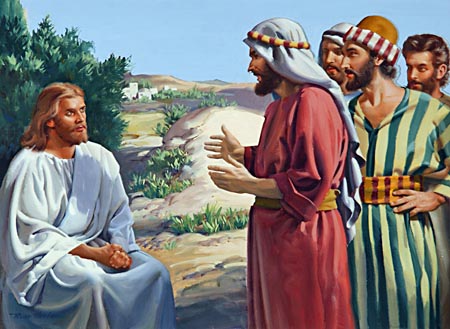 vs.39 They replied, “We can.”
vs.39 They replied, “We can.”
Jesus said to them,
“The cup that I must drink you shall drink, and with the baptism with which I must be baptised you shall be baptised,
vs.40 but as for the seats at my right hand or my left, these are not mine to grant; they belong to those to whom they have been allotted.”
vs.41 When the other ten heard this they began to feel indignant with James and John,
vs.42 so Jesus called them to him and said to them,
“You know that among the pagans their so-called rulers lord it over them, and their great men make their authority felt.
vs.43 This is not to happen among you. No; anyone who wants to become great among you must be your servant,
vs.44 and anyone who wants to be first among you must be slave to all.
vs.45 For the Son of Man himself did not come to be served but to serve,
and to give his life as a ransom for many.”
*******************************************
We have four commentators available from whom you may wish to choose
Michel DeVerteuil : Holy Ghost Priest, late director of the Centre of Biblical renewal , Trinidad WI.
Thomas O’Loughlin: Prof of Hist Theology University of Nottingham NG7 2RD
Sean Goan: Studied scripture in Rome, Jerusalem and Chicago
Donal Neary SJ: Editor of The Sacred Heart Messenger and National Director of The Apostlship of Prayer.
****************************************
Michel DeVerteuil
Lectio Divina with the Sunday Gospels, Year B
www.columba.ie
Textual Comments
There are two distinct sections in this passage:
– verses 35 to 40: the encounter between Jesus and the sons of Zebedee
– verses 41 to 45: his teaching on service.
The dialogue with the sons of Zebedee is very dramatic, with plenty of significant details.
As usual with gospel stories, feel free to focus either on Jesus or on the people who come to him.

James and John are typical of young, enthusiastic followers of any cause – very ambitious, but also very committed and ready for everything. Note how they are confident: they can accept the challenges, even if they do not see clearly what they entail.
The portrayal of Jesus is very touching: his respect for the young men, the way he takes them seriously, the way he challenges them and reassures them simultaneously. His humility is remarkable as he disclaims the authority to give final rewards.
As in last week’s passage, Jesus is the model for civil as well as religious leaders, and the two brothers can be the church community or the nation.
-Verse 45 is very deep and can be read by itself. Enter into the metaphor of the ransom, asking yourself how this ancient practice of buying back slaves is lived today when people give themselves to the work of human liberation, with the life of Jesus as the model.
Scriptural Reflection
Lord, we remember with gratitude the spiritual journey we have made.
At first we were like the sons of Zebedee, very anxious to become loyal and to do great things for you. Truly we did not know what we were asking.
 You did not reject us, but rather guided us gently,
You did not reject us, but rather guided us gently,
~ some of us through prayer and bible reading;
~ others through a guide who was Jesus for us.
You made us understand that spiritual growth is setting out on the path of Jesus, drinking whatever cup of suffering you send us, and entering deep waters as you did.
As the challenge came, we said “Yes”, and you certainly took us at our word.
Today we find that we are not interested in success of any kind.
We know that sitting at your right hand or at your left in your glory is not something that any one can give us, or that we can earn for ourselves, and we leave that to you to allot to whoever you will.
Lord, we thank you for young people, especially those of us who work with youth in schools, church communities or families. We thank you for their enthusiasm and their great desires.
Don’t let them become cynical just because they do not know what they are asking.
Help us rather to be like Jesus and walk with them, challenging them, but also reassuring them that they can in fact make the sacrifices which their desires imply.
Lord, leaders are afraid to ask sacrifices of their people; they like to promise great rewards in some future kingdom even though these rewards are not theirs to give.  We pray that they may be like Jesus, honest with their people.
We pray that they may be like Jesus, honest with their people.
But of course, if they ask a sacrifice of their followers, they must go that way themselves,
the cup they ask others to drink must be one they drink themselves,
and if they ask others to receive a baptism it should be one they have received themselves.
Lord, forgive us that as a church we promise people heavenly rewards if they fulfil certain requirements.
Remind us that places us at your right hand or your left are not ours to give
but belong to those to whom they have been allotted.
‘Lord, it is not easy to work for the liberation of oppressed people.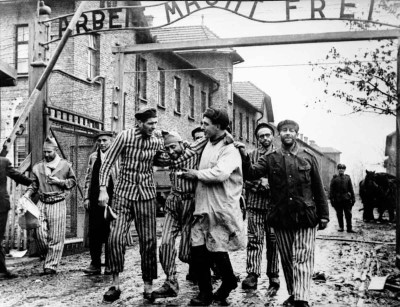
We would like to do it the easy way, giving handouts or making nice speeches.
But Jesus has shown us that this kind of work is always costly.
It is like the ancient practice of buying back slaves, except that for us the money we have to put out is our own selves, our security and our need to be successful,
allowing ourselves to be hurt and in that way healing the hurts of others and helping them go free.
Lord, we remember the times that jealousy arose in our church community, our parish council, the choir, or the youth group, some trying to get places of honour and others indignant with them.
Then you sent someone who called us together and showed us how we were no different from the other rulers in our society, or other important people who like to make their authority felt.
We realised at that moment that this should never happen among us because for us to be great or important is to be at the service of all.
Lord, we pray for those who are about to get married, that they may understand what they are asking of each other, which is that whatever cup of suffering one has to drink the other must drink it too,
and whatever baptism life demands of one, the other must enter into that baptism too.
*************************************
Thomas O’Loughlin
Liturgical Resources for the Year of Matthew
www.columba.ie
Introduction to the Celebration
 Today we reflect on how Jesus came among us. He came as the one sent by the Father to bring us new life, yet he came among us as seeking to serve rather than to be served. We reflect also that for us, his followers, his way of life sets us a pattern for how we should live. In a world filled with the suffering caused by power struggles Jesus reminds us that our community here must display a different way of being human:
Today we reflect on how Jesus came among us. He came as the one sent by the Father to bring us new life, yet he came among us as seeking to serve rather than to be served. We reflect also that for us, his followers, his way of life sets us a pattern for how we should live. In a world filled with the suffering caused by power struggles Jesus reminds us that our community here must display a different way of being human:
‘Anyone who wants to become great among you must be your servant,
and anyone who wants to be first among you must be servant of all.’
Homily Notes
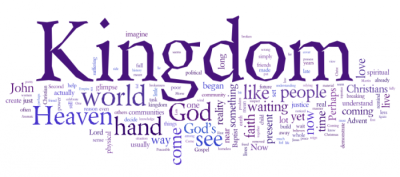 1. The values of the kingdom are exactly opposite to those of the world of power politics, social climbing, and vain display. We all know this, yet generations come and generations go by, and we still import titles of honour, displays of prestige, and even the jargon of imperial Rome, the cursus honorum, into the church.
1. The values of the kingdom are exactly opposite to those of the world of power politics, social climbing, and vain display. We all know this, yet generations come and generations go by, and we still import titles of honour, displays of prestige, and even the jargon of imperial Rome, the cursus honorum, into the church.
The pope may take the title ‘Servant of the servants‘, but a look at the pomp and circumstance surrounding the papal ceremonies suggests that the need for a power display outweighs theology.
Bishops are to be servants, but ‘for the people’s sake’ they wear the last remnants of imperial purple.
Clergy are called to take on extra ministry over and above the ministry of the baptised, but in exchange they get a range of titles all suitably graded so that everyone from a newly ordained deacon to Vicar General knows exactly which rung each is on. Reading this Gospel should make us all mightily embarrassed!
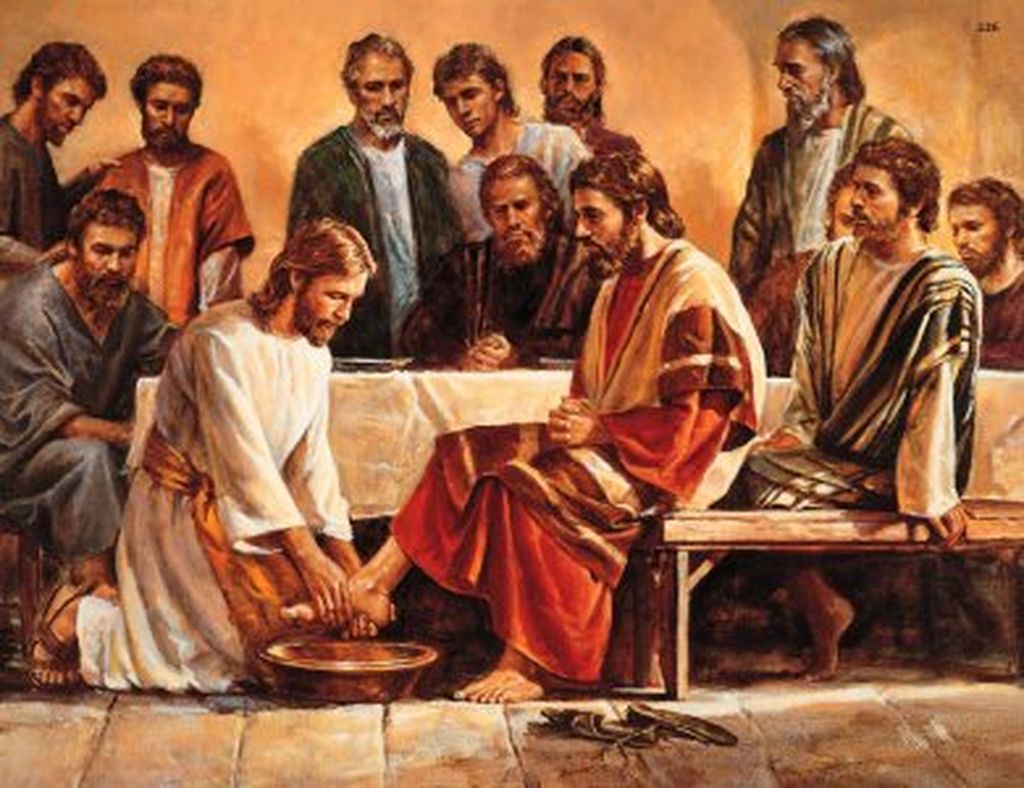 2. When John in his gospel wanted to convey the same message he did not have a little teaching scene like this one we read today; rather he had Jesus get up and wash the feet of his disciples with all the messiness and embarrassment that goes with such an act of service. Moreover, we know that foot washing was one of the ways that Christians in the early churches learned how they should see one another as brothers and sisters in Christ (e.g. 1 Tim 5:10). Indeed, it survived as a rite used regularly in some monasteries and by bishops on Holy Thursday. Now it has a formal place in the worldwide liturgy of the Lord’s Supper on Holy Thursday — although it is still such a shocking message that it is always in danger of being simply skipped or turned into a token affair.
2. When John in his gospel wanted to convey the same message he did not have a little teaching scene like this one we read today; rather he had Jesus get up and wash the feet of his disciples with all the messiness and embarrassment that goes with such an act of service. Moreover, we know that foot washing was one of the ways that Christians in the early churches learned how they should see one another as brothers and sisters in Christ (e.g. 1 Tim 5:10). Indeed, it survived as a rite used regularly in some monasteries and by bishops on Holy Thursday. Now it has a formal place in the worldwide liturgy of the Lord’s Supper on Holy Thursday — although it is still such a shocking message that it is always in danger of being simply skipped or turned into a token affair.
3. Given that the gospel should make any cleric uncomfortable, and anything one says about the gospel is likely to be taken as hypocritical self-justification, a better commentary on the gospel is to actually perform the action Jesus carried out and wished us to carry out in imitation of him.
Therefore, introduce the actual practice of foot washing —many in any average congregation will never have seen it or will not remember it from Holy Thursday — and then wash the feet of a group of the community.
Meanwhile, have these words from John read as a commentary on the action taking place: When he had washed their feet, and taken his garments, and resumed his place, he said to them,
‘Do you know what I have done to you?
You call me Teacher and Lord; and you are right, for so I am.
If I then, your Lord and Teacher, have washed your feet, you also ought to wash one another’s feet.
For I have given you an example, that you also should do as I have done to you.
Truly, truly, I say to you, a servant is not greater than his master;
nor is he who is sent greater than he who sent him.
If you know these things, blessed are you if you do them’ …(John 13:12-17).
Then, while the action of foot washing continues, have the shorter form of today’s gospel re-read.
 4. Apart from one action being worth several thousand words, by making a community more familiar with the action of foot washing one is enriching the repertoire of the community’s liturgical experience and helping the community appreciate the action on Holy Thursday more fully.
4. Apart from one action being worth several thousand words, by making a community more familiar with the action of foot washing one is enriching the repertoire of the community’s liturgical experience and helping the community appreciate the action on Holy Thursday more fully.
Many people grumble that no matter how short a homily is, it is still too long — words have become cheap. An action like foot washing will make people sit up — no doubt you reading this think the idea daunting (so too did St Peter) —and hear today’s gospel on its second reading in a way they did not when it was first read!
**********************************
Sean Goan
Let the reader understand
www.columba.ie
Gospel
The story of the apostles James and John continues with the theme of discipleship in this section of Mark. To appreciate what unfolds here it is important to remember that in the two chapters before this Jesus has consistently challenged his disciples with the core values of the kingdom.
They are to become like children, like servants; they are to give up all attachments; they are to be willing to take up their cross and follow and all this in the context of three predictions of the passion. So it is with that backdrop that James and John coming looking for special status in Jesus’ future glory. The extent of their complete incomprehension is baffling but Jesus shows great patience with them and points out that they will indeed share his future but the glory they seek is not his to give. 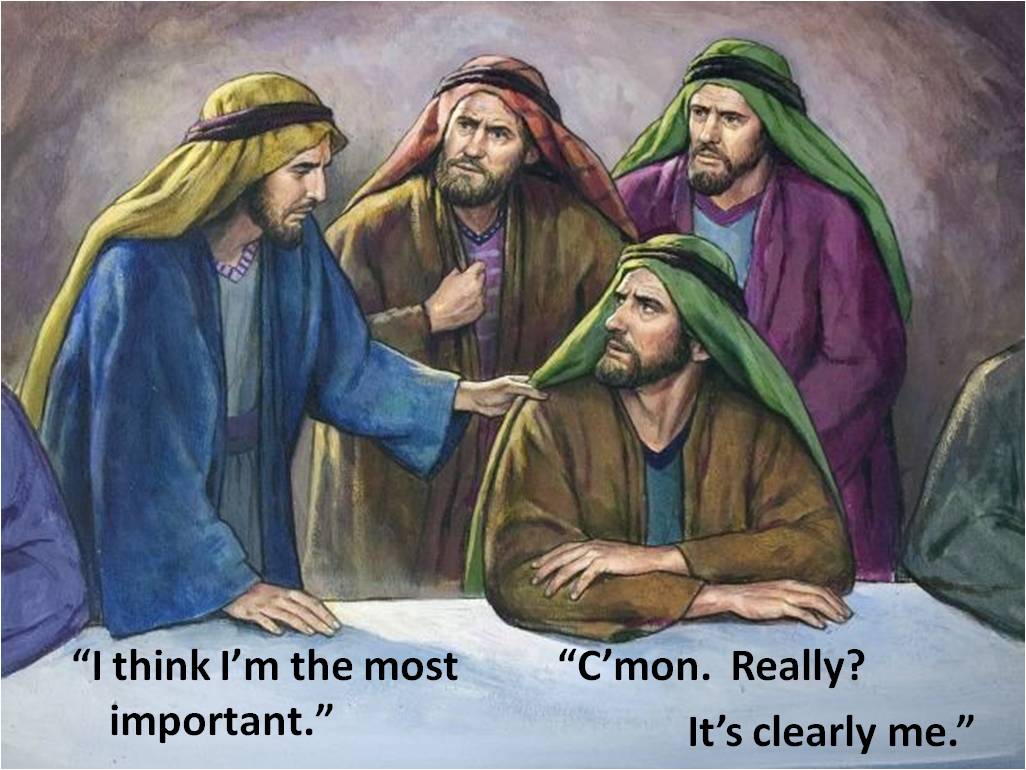 It would be heartening to think that the other ten were annoyed with James and John for the folly of their question but it might be more realistic to believe their concern was that they might have been upstaged by the other two.
It would be heartening to think that the other ten were annoyed with James and John for the folly of their question but it might be more realistic to believe their concern was that they might have been upstaged by the other two.
So when Jesus gathers them around him it is to tell them once again that in the kingdom of God the exercise of power bears no resemblance to what takes place in the world around them. True greatness lies in service and their model for this is Jesus himself.
Reflection
It is a remarkable fact that in Mark, the first of the gospels, one of the consistent themes is that of the incomprehension of the disciples. Again and again they fail to understand what Jesus is talking about and they are also portrayed as being afraid to ask him. They are presented as somewhat self seeking and dull and at times even Jesus becomes exasperated with them (8:14-21). In choosing to present them this way, perhaps Mark was trying to tell us something:
take time to recognise yourselves in this portrait of the disciples.
The good news is indeed good but it challenges the values that we take for granted and are very much part and parcel of the world we live in. So when we choose the way of the gospel we should not be surprised that it involves a steep learning curve and we too may well turn out to be slow learners!
******************************
Donal Neary SJ
Gospel Reflections for Sundays of Year B
www.messenger.ie/bookshop.
Servant of All
The gospel this week is a story of ambition, even cloaked in good intentions. A mother wants her sons in the best place, and they pick up that ambition from her. The apostles see James and John as wanting to be tops with Jesus. He accepts all this, but let them know that to be close to him means to suffer with him, and to be a servant.
Many times we see this in the gospel: giving a cup of cold water to a needy person was what a good person did, “washing the guests’’ feet was what a servant did. Jesus brought service even further – to serve like him was to serve God his Father, because that was what his mission on earth would be.
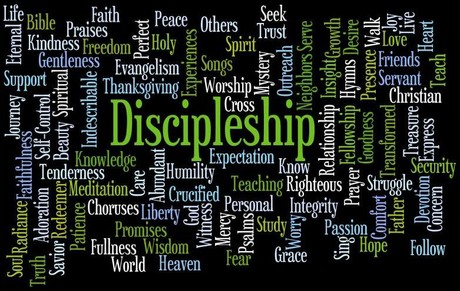
We hear often of the servant church – it means that the community of Jesus’ followers are at the service of people, to make better conditions of life, to live and share with compassion in the hardships of others, to care for the earth and protect it. This service people is the service of God. In that mission Jesus would be misunderstood, and eventually put to death.
(Focusing on the image left, when was the last time you served a fellow traveller of life with any of Christ’s signs of Discipleship)
Even after death we see Jesus as a sort of servant of the apostles – reaching out to them to share his joy and consolation. He would be the one to walk with them in their doubts, fears and disappointments. He now seems to want to be a servant of others through us also in his risen life.
Think of the day ahead or the week,
and offer yourself in the service of the Lord to someone needy
Lord may I serve you and be with you in all I do and care for.
____________________________________